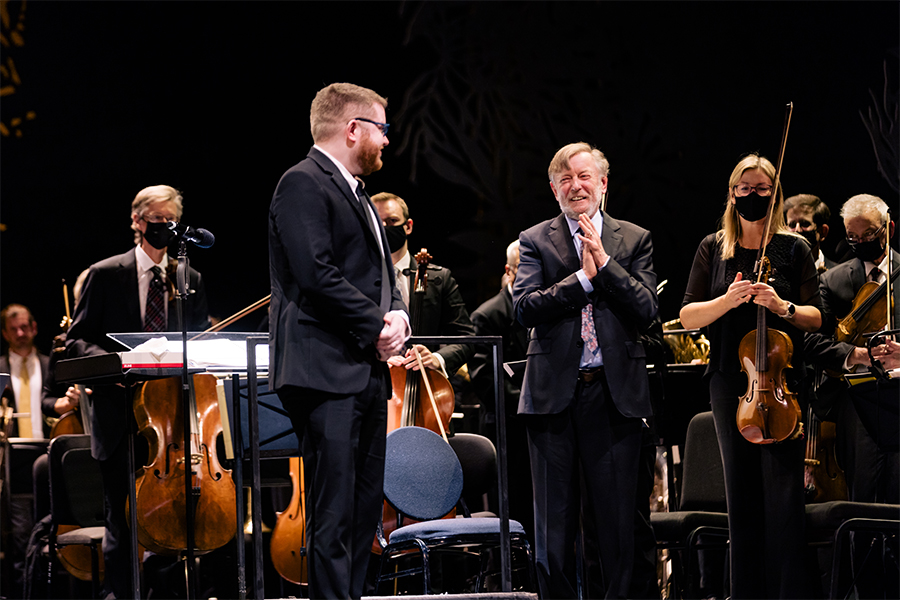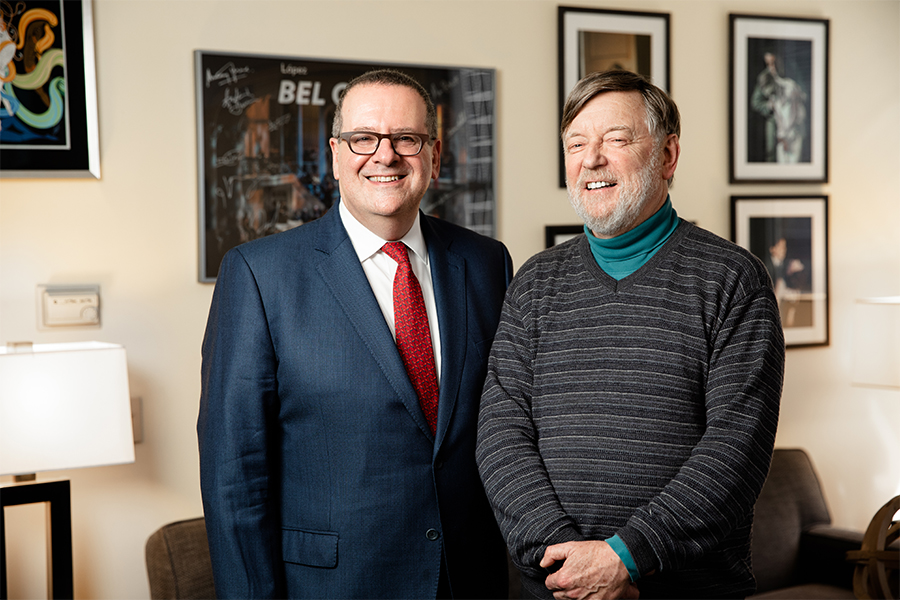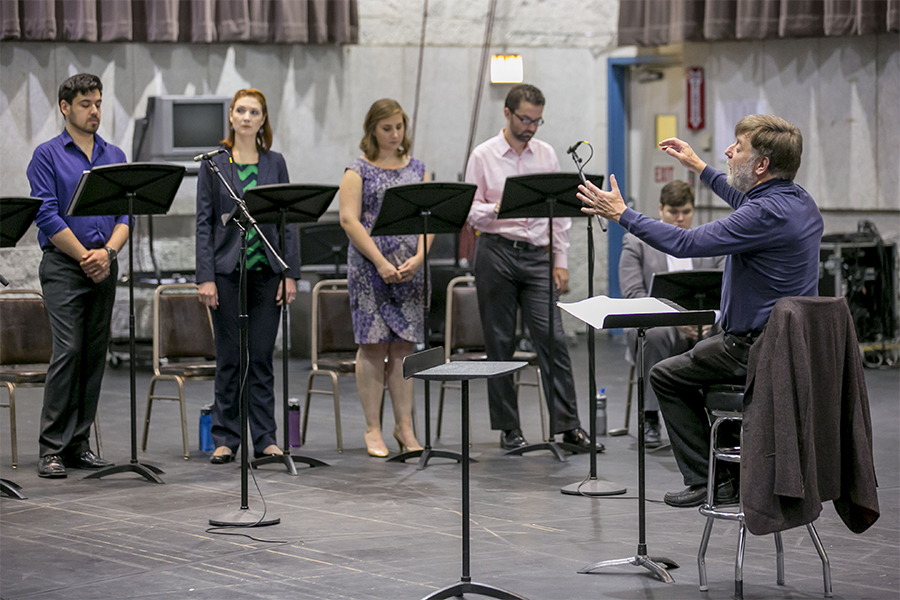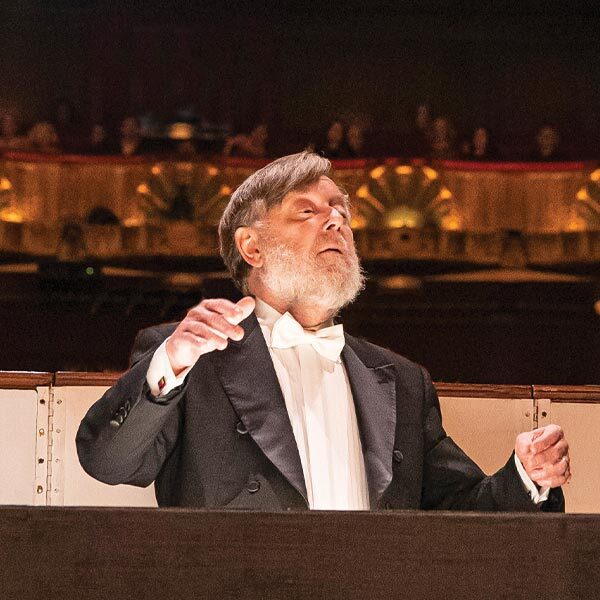March 31, 2022
Ode to the Maestro
Over more than two decades, former music director Sir Andrew Davis thrilled audiences at Lyric with illuminating interpretations across all the repertoire. And don’t worry—he’ll be back often.
When Sir Andrew Davis conducts the Lyric Opera Orchestra and Chorus, and vocal soloists, in Beethoven's Ninth Symphony, that iconic celebration of universal brotherhood will celebrate something else as well: Sir Andrew's extraordinary legacy of musical achievement during his 21 years as Lyric's beloved former music director and principal conductor.
Bear in mind that this is not a valediction, but a commemoration—of a special artistic relationship that has profoundly shaped Lyric's present eminence on the world operatic stage.
The numbers speak for themselves. The Davis directorship brought an astonishing 700 performances of 61 operas by 21 different composers under his baton, plus numerous special concerts—a record unmatched in scope by all but a handful of resident opera conductors anywhere, anytime. Yet the numbers cannot explain the imprimatur that Britain's podium gift to Chicago has left so indelibly on Lyric's artistic development and, indeed, on the musical life of the city in general.

Sir Andrew Davis and his son, composer Ed Frazier Davis, onstage for A Concert in Celebration of the Life of Gianna Rolandi in November 2021.
Davis' versatility, musical depth, and unerring ability to draw great performances from his colleagues all factor into the equation, according to Anthony Freud.
"I don't know of another conductor who has such facility with such a wide range of musical styles and at the same time has the ability to avoid any performance seeming generic," Lyric's general director, president and CEO observes.
Freud should know, having closely followed his colleague's brilliant career ascent from 1988, when Davis became music director of Glyndebourne Festival Opera, continuing with his appointment three years later as chief conductor of the BBC Symphony. Without question his experience and honing of skills at those British musical institutions and elsewhere impacted directly on his work at Lyric.
Since 2000, when Davis succeeded the late Bruno Bartoletti as Lyric music director, he has raised the orchestra's technical and musical standards to a remarkable degree, making it one of the finest, most flexible ensembles of its kind in the world. The chemistry, everyone agrees, was there from the start.
Singers also hold the hearty Englishman in the highest esteem, not least because he gives them the rock-solid yet flexible support they need to do their best work on stage. Davis' personal charm and avuncular manner, in fact, go a long way towards maintaining a deep sense of collegiality with musical colleagues, administrative staff and board members, and audiences.
Freud recalls "the first serious meeting" he had with Davis prior to his own official arrival at Lyric in October 2011.
"Ken Pigott [Lyric's late former board president and CEO] invited us to his office," Freud says. "He put us in his conference room and left us to get on with it. Two hours later we emerged having found this instant rapport, partly because I think we were so energized at the thought of what we dreamt of Lyric achieving—two Brits sharing a sense of humor and many common reference points and memories that allowed the rapport to click, really, from the first moment.
"Very quickly it became clear we would have a very productive, cordial, rewarding artistic partnership. And, indeed, that's how the decade of our working together turned out to be."

Sir Andrew Davis with Lyric's general director Anthony Freud
In my role as the longtime critic for the Chicago Tribune, I often had a close-up listen to the conductor's work. Looking back at my reviews of his performances over the years, I am struck by the consistently high quality he maintained, regardless of repertoire, cast, or production. With him, there was never a hint of the slapdash, nothing routine, nothing overdone or underdone, no significant musical detail overlooked.
In 1987, 13 years before Davis took over as music director, he made his Lyric podium debut, conducting inspired performances of The Marriage of Figaro. Chicago audiences soon found that the operatic Mozart was like mother's milk to him, and each of his Mozartean assumptions—including the Mozart-da Ponte operas Figaro, Don Giovanni, and Così fan tutte, as well as Abduction from the Seraglio, Magic Flute, Idomeneo and La clemenza di Tito—revealed a deeply engaged symbiosis between pit and stage that unveiled the emotional truths at the heart of these imperishable masterpieces.
Operagoers and critics everywhere praise Davis' Richard Strauss performances, each with its own tinta, its own warmly idiomatic sound, style, and feeling. Few conductors this side of Vienna or Munich are better equipped by talent or temperament to bring this repertoire alive on stage in a truly meaningful way. Small wonder his Chicago performances of Ariadne auf Naxos, Capriccio, Elektra, Die Frau ohne Schatten, Der Rosenkavalier, and Salome remain so memorable.
One of the great Wagner conductors of our time, Davis favored Lyric audiences with his first Ring of the Nibelung cycle in 2005 and partially realized his and Freud's dream of mounting a new staging of the tetralogy, beginning with Das Rheingold in 2016/17 and culminating in three complete cycles in April-May 2020. The latter fell victim to the pandemic, along with Götterdämmerung, the concluding (and unveiled) segment of director Sir David Pountney's imaginative staging. Despite those regrettable losses, the fact remains that Chicago heard many magisterial Wagner performances from Davis during his tenure, when he presided over all the mature Wagner music dramas, from The Flying Dutchman, Tannhäuser and Lohengrin to the Ring, Tristan und Isolde, and Parsifal.
Another monumental project was Lyric's first-ever production of Berlioz's The Trojans during the 2016/17 season, the realization of another long-cherished dream of both Davis and Freud. The performances turned out to be a triumph for all concerned.
And while one may shed a furtive tear that scheduling and other priorities prevented Sir Andrew from demonstrating his affinity for an even wider range of 20th century operas, any conductor who can lead Berg's Wozzeck and Lulu, Britten's Billy Budd, and Leoš Janáček's Jenůfa and The Cunning Little Vixen with such idiomatic flair has nothing to apologize for.

Sir Andrew Davis leads a music workshop with Ryan Opera Center artists ahead of the world premiere of Jimmy López's Bel Canto.
As for new operas, Davis helped enormously to guide the evolution of Lyric's world-premiere performances of Jimmy López's Bel Canto (based on Ann Patchett's novel) from page to stage, giving the composer invaluable advice as to structure, orchestration, balance, and much more. "He was endlessly supportive of Jimmy without in any way interfering," Freud says.
So keen is Sir Andrew's musical curiosity about unfamiliar operas that he eagerly agreed to conduct the Lyric premiere of Mieczysław Weinberg's powerful Holocaust-themed opera The Passenger here in 2014/15, Freud says. In so doing, Davis lent cachet to an important 20th century stage work Chicago audiences needed to hear.
Mind you, those are but highlights from a wide-ranging track record of Davis performances at Lyric that included operas by Verdi, Puccini, Rossini, Tchaikovsky, Bizet, Dvořák, Gounod, Lehár, Massenet, Mussorgsky and Poulenc—not to mention the Gilbert and Sullivan operettas Mikado and The Pirates of Penzance in which Davis proved himself a Savoyard to the manner born.
So let us raise a glass to the beginning of a new phase in the longstanding love affair between Lyric Opera and Sir Andrew Davis. At 78, he does not look, sound, or behave like a maestro who's going gentle into that good night of retirement. He continues to fill engagements worldwide and will return to Lyric as honored guest in January, when he is scheduled to lead performances of one of his favorite operas, Humperdinck's Hansel and Gretel.
And so, bravissimo, Sir Andrew—and grazie mille!
April 1, 2022
Sir Andrew Davis Conducts Beethoven 9
Sir Andrew Davis Conducts Beethoven 9
Lyric will celebrate Sir Andrew Davis’s magnificent two-decade tenure as music director with one of his favorite works, never previously performed at Lyric: Beethoven’s enthralling, life-enhancing Symphony No. 9, the “Choral,” music’s most exalted hymn to the human spirit. Sir Andrew will conduct a superb vocal quartet with the wonderful Lyric Opera Orchestra and Chorus. The concert will begin with a new choral work by Sir Andrew’s son, Ed Frazier Davis, an impressively gifted composer.
Header photo: Sir Andrew Davis takes a bow with the cast of The Queen of Spades in spring 2020. Credit: Cory Weaver
All other photos: Kyle Flubacker, Todd Rosenberg

